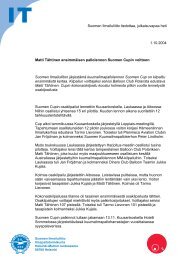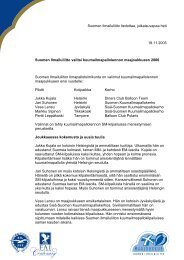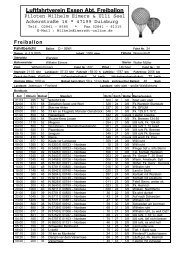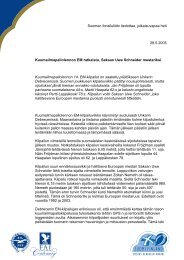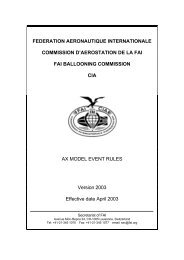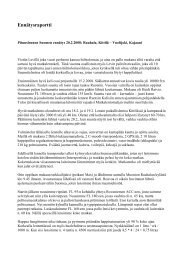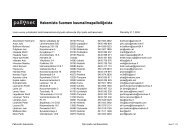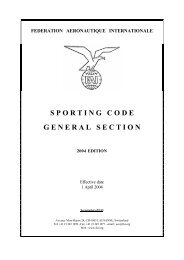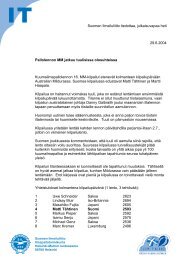You also want an ePaper? Increase the reach of your titles
YUMPU automatically turns print PDFs into web optimized ePapers that Google loves.
CHAPTER 13 PENALTY GUIDE<br />
CIA COMPETITION OPERATION HANDBOOK<br />
WHAT IS A PENALTY?<br />
The Webster Dictionary defines among other things under 3.b a penalty as:<br />
3.b A disadvantage (as loss of yardage, time, or possession of the ball or an addition to or<br />
subtraction from the score) imposed on a team or competitor for violation of the rules of a<br />
sport.<br />
Further guidelines and definitions are given in the Sporting Code Section I and in the AXMER.<br />
WHY A PENALTY GUIDE?<br />
Our sport has matured from the experimental stage to a more mature stage where rules and penalties<br />
are less disputed. It is therefore time to write down to what the debate over rules and penalty<br />
interpretation has produced in order to avoid future discussions and reinvention of wheel. This<br />
guideline is therefore a ‘guideline’ and nothing more or less. The SWG recommends that it be used as<br />
such without wanting to prevent discussions and interpretations.<br />
There are two schools of Competition Direction; one that wants all penalties to be fixed or fixed as<br />
much as possible and the other that wants as little as possible fixed penalties in order to be able to<br />
vary the penalty. Both views have merit.<br />
When fixing penalties the Director is in a position that seems more objective because he only has to<br />
prove the infraction. Disadvantage though is, that he is not in a position to vary a penalty when, e.g. in<br />
his view the competitor’s fault is minor.<br />
Not specifying penalties puts a great pressure on the judgement of the Director, but he is in a position<br />
to weigh the infraction. Disadvantage is that he may be accused of prejudgement and favouring or<br />
disfavouring a competitor, also he may be totally wrong because of lack of experience e.g.<br />
Generally one might say that in the ideal world only a few rules deserve a fixed penalty and the rest will<br />
be determined by the good judgement of the Director. This however puts a great burden on him and<br />
therefore it has been decided to provide the Penalty Guide as means to streamline penalties without<br />
binding the hands of the Director too much. Especially lesser-experienced Directors will find this guide<br />
very useful we hope.<br />
WHAT FACTORS PLAY A ROLE IN A PENALTY<br />
Safety<br />
There is no doubt that Safety is a prime factor to be considered and abusing safety is listed as a<br />
“Serious Infringement” in the Sporting Code. Whether and how something affects safety or not should<br />
be judged objectively and with common sense. Penalizing a competitor 200 points for attaching his<br />
quick release to a wrong point on his car in first instance would be unjust although it affects safety.<br />
Competition advantage<br />
This is sometimes easy to determine and sometimes very difficult. Is it a competition advantage if a<br />
competitor touches a blade of grass close to the goal? Certainly not when you think of the effect it has<br />
on his result, but yes when you compare him with the prudent pilot paying a lot more attention in<br />
avoiding this.<br />
Deliberate or unintentional infractions<br />
Generally infractions are made by: not knowing the rules, inattention, inexperience and/or bad luck.<br />
Sometimes however they are deliberate generally as a tactical manoeuvre less frequent as intentional<br />
deceiving.<br />
Version 2007 Page 24



